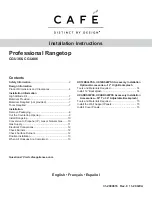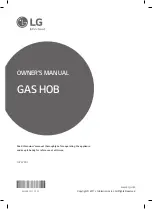
3
INSTRUCTIONS FOR THE USER
It is necessary that all the operations regarding the installation, adjustment and
adaptation to the type of gas available are carried out by qualified personnel, in
conformity with the regulations in force.
The specific instructions are described in the booklet section intended for the
installer.
USING THE BURNERS
The symbols silk-screen printed on the side of the
knob indicate the correspondence between the
knob and the burner.
Start-up without valves
Turn the corresponding knob anticlockwise up
to the maximum position (large flame, fig.1) and
press the knob.
Automatic start-up with valves
Turn the corresponding knob anticlockwise up
to the maximum position (large flame, fig.1) and
press the knob.
Once the burner has been started up, keep the
knob pressed for about 6 seconds.
Using the burners
In order to obtain the maximum yield without waste
of gas, it is important that the diameter of the pot is
suitable for the burner potential (see the following
table), so as to avoid that the flame goes out of the
pot bottom (fig. 2).
Use the maximum capacity to quickly make the
liquids reach the boiling temperature, and the
reduced capacity to heat food or maintain boiling.
All of the operating positions must be chosen
between the maximum and the minimum ones,
never between the minimum position and the
closing point.
The gas supply can be interrupted by turning the
knob clockwise up to the closing position.
If there is no power supply, it is possible to light the
burners with matches, setting the knob to the start-
up point (large flame, fig.1/1A).
BURNERS
Power W
Ø of pots
Semi-rapid
1750
16 - 18 cm
Rapid
3000
20 - 22 cm
Notice
-When the equipment is not working, always check
that the knobs are in the closing position (see
fig.1).
-If the flame should blow out accidentally, the
safety valve will automatically stop the gas supply,
after a few seconds. To restore operation, set the
knob to the lighting point (large flame, fig.1) and
press.
-While cooking with fat or oil, pay the utmost
attention as these substances can catch fire when
overheated.
-Do not use sprays near the appliance in operation.
-Do not place unstable or deformed pots on the
burner, so as to prevent them from overturning or
overflowing.
-Make sure that pot handles are placed properly.
-When the burner is started up, check that the
flameis regular and, before taking pots away,
always lowerthe flame or put it out.
CLEANING
Before any operation, disconnect the appliance
from the electric grid. Don’t use a steam
cleaner for the cleaning the hob.
It is advisable to clean the appliance when it is
cold.
Enamelled parts
The enamelled parts must be washed with a
sponge and soapy water or with a light detergent.
Do not use abrasive or corrosive products.
Do not leave substances, such as lemon or tomato
juice, salt water, vinegar, coffee and milk on the
enamelled surfaces for a long time.
Stainless steel parts
Stainless steel can be stained if it remains in
contact with highly calcareous water or aggressive
detergents for an extended period of time.
The stainless steel parts should also be cleaned
with soapy water and then dried with a soft cloth.
Burners and racks
These parts can be removed to make cleaning
easier.
The burners must be washed with a sponge and
soapy water or with a light detergent, wiped well
and placed in their housing perfectly. Make sure
that the flame-dividing ducts are not clogged.
Check that the feeler of the safety valve and the
start-up electrode are always perfectly cleaned, so
as to ensure an optimum operation.
Gas taps
The possible lubrication of the taps must be carried
out by specialized personnel, exclusively.
In case of hardening or malfunctions in the gas
taps, apply to the Customer Service.


























